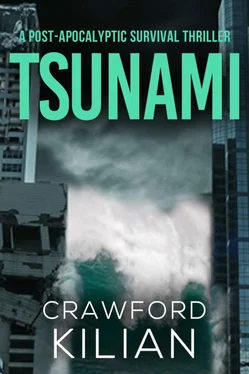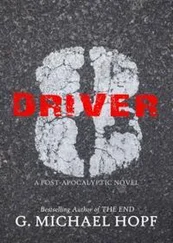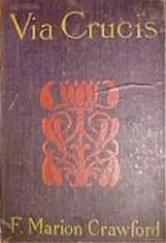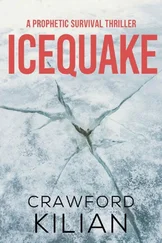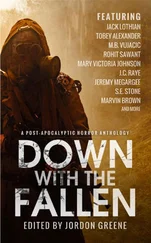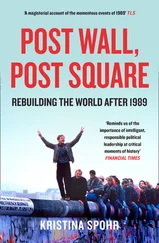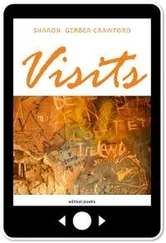In most places it was hard to tell where the water left off and the land began: a seemingly solid mass of rubble would bob up and down as a wave passed through the water beneath it, and many buildings on the old waterfront survived as brick islets. Chief finally found a place where he could bring the Zodiac to shore at a gap in the irregular wall of wreckage. The western approaches to the Bay Bridge loomed through to the smoke nearby.
“Good luck to you all,” he said as they scrambled ashore. Don shook his hand again.
“Thanks, Chief. Give my respects to Mrs. Debney.”
The streets behind the waterfront had always been grimy and decayed; now they were deserted and flooded. The ten passengers from the Zodiac waded ankle-deep through black water. No one else could be seen, and it was very quiet.
After three or four blocks, they came to a freeway access ramp and walked up it. The freeway itself held a few abandoned cars and trucks — most already stripped — as well as hundreds of people on toot or bicycles, travelling in both directions.
“Never saw traffic move so fast,” someone said, and everyone laughed nervously.
The others all had homes in San Francisco; they turned to the southwest. Don said good-bye and turned northeast, towards the Bay Bridge. He walked quickly, head down, but already felt the tingle of sunburn on his face and hands.
By the time he reached the shelter of the bridge’s lower deck, his feet hurt and he was feeling unexpected awe at the sheer size of the city’s highway system. The bridge extended into a smoky distance; the grade was a steady, seemingly endless uphill climb.
It was easier for him, he saw, than for many others. Old people and children straggled among the deserted cars. Many people carried heavy bundles, or pushed wheelbarrows loaded with possessions.
A tall, stocky Chinese man in his twenties fell into step with Don. He looked at the PIO badge on Don’s duffle bag.
“You a sailor?”
“Oceanographer.” He put out a hand. “Don Kennard.”
“Dennis Chang. Hi, good to meet you. I’m a biologist.”
“Where you headed, Dennis?”
“Gotta check on my mom and dad. They live in Berkeley.” He looked off to the north and northeast, where a long arm of the burning oil slick extended across the bay from Richmond almost to Tiburon. “Look at that sucker burn. Man, that’s one of the worst parts of this whole mess — we’re losing the energy we need to rebuild.” “They’ll just tighten up the rationing,” Don said with a shrug.
“Boy, I sure wish I could believe it’d be that easy. I work for an outfit called Neogene. Ever hear of it?”
“Sure. Down in Palo Alto.” He paused. “Dennis Chang. You don’t work for Neogene, you own it.”
“It owns me. Anyway, last year we got a contract with the Energy Department to see if we could design a high-quantity methanogen out of E . coli . Put enough of ‘em in a vat and they’ll grow until their tiny little farts add up to lots and lots of natural gas.”
“Did it work?”
“Not yet. Another eight, ten months maybe. The point is, the people in Washington were really hot to get it developed, because as far as they could tell we were going to be strapped for oil by this summer. Really strapped.” He waved at the burning slick. “Now look what we have to contend with.”
“Well, if the fuel shortage is going to be that bad, your outfit ought to have top priority.”
“Sure, in theory. But it’ll take weeks to reorganize. My people will be applying for disaster loans and pumping out their basements, instead of working in the lab. The government’s going to be scrambling around with a million other things on its mind.”
They plodded on over the bridge, trading disaster stories and gossiping about mutual acquaintances. Don was glad to have company; as he neared home he was beginning to be afraid of what he might find.
It was late in the afternoon when they reached the eastern shore of the bay. The bridge slanted gently down to where the toll plaza had been, between the mud flats and the Army Terminal; now the shoreline was a broad tangle of wreckage. The seiches had jumbled trees, logs, cars and shattered concrete blocks into a low barrier almost a kilometre wide, from the water to the far side of the freeway.
Many of the people who had walked across the bridge seemed to give up at the sight of the obstacle before them. Some turned back towards San Francisco; others erected crude shelters and even started campfires on the pavement. A few abandoned whatever they had been carrying and began to clamber through the wreckage zone. Don and Dennis watched them working their way through the zone and followed what looked like the easiest path.
Over an hour later, the two men reached what was left of the East Shore Freeway. Its eight lanes were choked with overturned cars, uprooted trees, mud, stones, and even houses wrenched from their foundations. Corpses lay half-buried in the mud, and rats skittered among them.
Speaking very little, they went on north to the University Avenue off-ramp. It was hard going for the first kilometre inland, over mud banks and across big, water-filled holes gouged in the pavement.
At the intersection of University and San Pablo stood two black policemen in orange ponchos. They motioned to Don and Dennis.
“Where you fellas headed?” the older policeman asked. They told him. “Better hustle. Curfew is at seven. Lasts until seven tomorrow morning.”
“Curfew?” Dennis echoed. “Who ordered it? The governor?”
“The mayor. Haven’t heard from the governor all day, far as I know.”
“What if you stay out past seven?” asked Don.
“If you’re lucky, you get thrown in the can and you stay there till we remember to get around to you. If you’re not so lucky, you get shot.”
The two men went on up University; at Sacramento, Dennis shook Don’s hand and turned north. Alone, Don broke into a slow jog. He wanted to get home quickly.
The streets going up into the hills were deserted, though he saw many faces peering out into the twilight from darkened windows. Two blocks from home, he heard a gunshot and saw a tiny patch of sidewalk in front of him suddenly explode as the bullet ricocheted into the gloom.
Don sprang to his left, into the street, and ran for the cover of a parked car. Bent over, he scuttled on to the next car, and then dashed for the corner. The shot was not repeated.
He ran the last two blocks, and bounded up the steps from the sidewalk to the steep front yard of his house. The living-room curtains were drawn, but a sliver of light showed through. The door was locked; he fumbled for his keys and unlocked it, hoping the chain wasn’t latched.
The door swung open. He heard a gasp, and saw Kirstie lying fully clothed on the couch; two candles burned on the coffee table in front of her.
“Don? Oh Christ, but you frightened me!”
“You scared me too.” He shut and locked the door, and went to her. “Are you all right?”
“Yes, I’m fine. I must have fallen asleep the moment I got home.”
They talked while they improvised a dinner of sausage and stale bagels. She was horrified when he told her about the turbidity current; he shook his head and groaned when she described the fight in the drug room.
For a long time they sat in the kitchen, with a single candle, drinking room-temperature beer and talking quietly. Then they went upstairs and looked out the bedroom window.
“What do we do now?” he wondered.
She turned and looked at him, surprised. “Are you asking me? After all these years of telling me?”
“Kirstie — I’m damned if I know what to do next. After all we’ve gone through in the last six months with UV and flares, and then this. Did you know the cops are shooting people for breaking curfew? And I didn’t even get around to telling you — someone shot at me just down the street as I was coming home.”
Читать дальше
